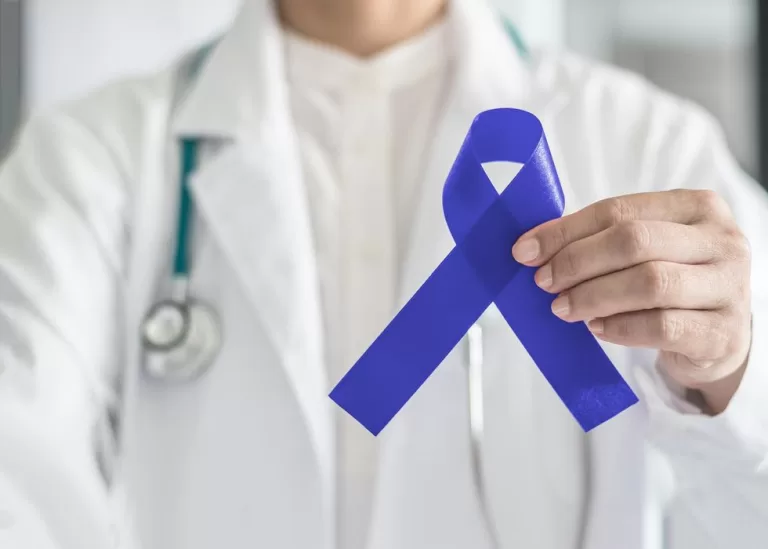[[{“value”:”
Colon cancer, also called colorectal cancer, is cancer of the large intestine or the rectum, and it’s one of the most common cancers in the United States. As many as 1 in 25 women (and 1 in 23 men) develop colon cancer during their lifetime.
Wondering what your risk is and what can you do about it? Trying to figure out whether you need a colonoscopy? In our new program, we delve into these questions so you can better understand the disease and learn how regular screenings can help prevent most cases.
In recent years, the recommendation for colon cancer screening has moved from age 50 to 45, as more younger people have started getting colon cancer. If you have a family history of colorectal cancer or other risk factors, talk to your healthcare provider (HCP) to see what age you should get screened. In some cases, it can even be earlier than 45.
That was the case for Alicia Maslar, who shared her story, “When I was 32, I Was Getting Ready to Marry and Have Kids. Then I Was Diagnosed With Colorectal Cancer.” She never imagined she could get colon cancer at such a young age. “I want women to advocate for themselves and have access to a colonoscopy, especially if they’re experiencing symptoms and are younger than the recommended screening age,” she explained.
No matter your age, everything about a colon cancer diagnosis can be overwhelming — from understanding treatment options to managing your mental health, we can help you navigate the next steps.
The good news is that colon cancer is highly preventable. In our infographic, “We Need to Talk About Colon Cancer,” we address removing the stigma in the hopes that more people will address any early symptoms with their HCP is key to better outcomes.
Read on to learn more screening, prevention and treatment of this common disease.
This resource was created with support from Merck.
The Connection Between Young Adults and Colon Cancer
La conexión entre adultos jóvenes y el cáncer de colon
How Fiber Can Reduce Your Risk for Colorectal Cancer
En qué forma la fibra puede reducir tu riesgo de cáncer colorrectal
No If, Ands or Butts: All Things Colon Cancer – Webinar
Who’s Most at Risk for Colorectal Cancer?
¿Quién tiene mayor riesgo de cáncer colorrectal?
Ask the Expert: Colorectal Cancer
How to Care for Your Mental Health if You Have Colon Cancer
Cómo cuidar tu salud mental si tienes cáncer de colon
My Symptoms Were Dismissed as Hemorrhoids, but I Had Colon Cancer
My Doctor Dismissed My Colon Cancer Red Flags as Normal Pregnancy Symptoms
Navigating a Colorectal Cancer Diagnosis
Fast Facts: What You Need to Know About Colorectal Cancer Screening
Cómo manejar un diagnóstico de cáncer colorrectal
We Need to Talk About Colorectal Cancer
Resource List
Colon cancer is one of the most common causes of cancer morbidity. Regular screening, beginning at age 45, is important to prevent colon cancer and for early diagnosis.
For more information on colon cancer, please talk to your healthcare provider and visit the resources provided below.
HealthyWomen Resources
Who’s Most at Risk for Colorectal Cancer? Ask the Expert: Colorectal Cancer How to Care for Your Mental Health if You Have Colon Cancer Meg Gets a Colonoscopy – Prep, Procedure, Recovery [COMIC] My Colon Cancer Was Dismissed as Pregnancy Symptoms No If, Ands or Butts: All Things Colon Cancer – Webinar – HealthyWomenAn ER Trip for My Shoulder Led to a Colon Cancer Diagnosis – HealthyWomen
En Español
¿Quién tiene mayor riesgo de cáncer colorrectal? Cómo cuidar tu salud mental si tienes cáncer de colon Meg se hace una colonoscopia
Additional Resources
What Should I Know About Screening for Colorectal Cancer? | CDCProvider Finder: https://fightcolorectalcancer.org/patient-provider-finder/Screening Brochure (English): https://fightcolorectalcancer.org/wp-content/uploads/2023/03/2022_Screening_Brochure_Digital.pdf Screening Brochure (Spanish): https://fightcolorectalcancer.org/wp-content/uploads/2023/03/2022_Screening_Brochure_Digital_Spanish.pdf“}]]



